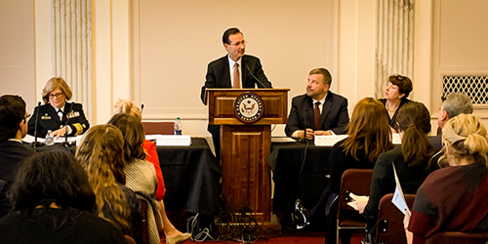
 |
December
- World AIDS Day (1)
- National Influenza Vaccination Week (2-8)
Funding Opportunities
Health Centers
Health Center Controlled Networks - Apply by January 3
Health Workforce
Advanced Nursing Education Workforce (ANEW) - Apply by January 8
Primary Care Training and Enhancement - Physician Assistant Program - Apply by January 14
Geriatrics Academic Career Award Program - Apply by January 15
Primary Care Training and Enhancement: Integrating Behavioral Health and Primary Care Program - Apply by January 28
Geriatrics Workforce Enhancement Program - Apply by February 6
Rural Residency Planning and Development Program - Apply by March 4
Healthcare Systems Bureau
Reimbursement of Travel and Subsistence Expenses toward Living Organ Donation - Apply by February 15
Administrator Briefs Congress
 |
In his briefing to Congress last week, Dr. Sigounas discussed agency assets on the ground, strategies and hallmark efforts — notably HRSA's first international summit on maternal mortality in June 2018, which brought together 130 experts, representatives of six countries and officials of the World Health Organization to discuss best practices in the fight against maternal mortality.
"In 2016, HRSA programs provided health care services to over 61 million mothers and children in the U.S., including 84 percent of all pregnant women and 63 percent of all infants and children ... With the ability to reach millions of people, HRSA continues to address maternal death collectively, using innovative ways," said Dr. Sigounas.
See HRSA's maternal mortality infographic (PDF - 544 KB).
HRSA-led Study Estimates 1 in 40 U.S. Children has Diagnosed Autism

November 26 – A new study led by HRSA found that about 1.5 million U.S. children — or 1 in 40 — have received a diagnosis of, and currently have, autism spectrum disorder. Published in Pediatrics, the analysis used data collected from parents of more than 50,000 children from the 2016 HRSA National Survey of Children's Health. The Centers for Disease Control and Prevention (CDC), Harvard University, Drexel University, and George Washington University contributed to the study.
Previous research has shown that autism diagnoses have increased in children over the past 20 years.
"Through the National Survey of Children's Health, our study provides the most recent nationally representative data on both the prevalence of autism and some of the challenges families face obtaining care," said lead author Michael D. Kogan, Ph.D., of HRSA's Maternal and Child Health Bureau. "This new information improves our capacity to understand and address autism, a complex neurological disorder."
|
HRSA Commemorates World AIDS Day 2018

On December 1st, the Health Resources and Services Administration commemorated World AIDS Day. The 2018 theme was "Collaborating to End the HIV Epidemic." HRSA Administrator Dr. George Sigounas issued a Dear Colleague Letter in recognition of the day, where he shared, "At HRSA, we continue to work together to improve health outcomes for people living with HIV by providing a comprehensive system of HIV care and treatment; strengthening the health workforce by training providers; and increasing HIV testing and support for people living with the disease. HIV has transformed from what was once a deadly disease to now a manageable, chronic condition if there is access to high-quality health care, critical support services, and appropriate medications. Today people living with HIV who take HIV medication daily as prescribed and achieve and maintain an undetectable viral load have effectively no risk of sexually transmitting the virus to an HIV-negative partner."
This comes on the heels of HRSA's HIV/AIDS Bureau’s 2018 National Ryan White Conference on HIV Care & Treatment, which takes place December 11-14, 2018, at the National Harbor in Oxon Hill, MD. This conference is the largest gathering of HIV/AIDS healthcare providers, Ryan White HIV/AIDS Program recipients, sub-recipients, planning bodies, consumers, and stakeholders. The conference provides a forum to share best practice models and strategies to provide a coordinated national response that is designed to expand access, improve treatment outcomes, and reduce new HIV infections and HIV-related health disparities.
|
HRSA Study Finds Pregnancy, Childrearing May be Linked to Cardiovascular Risk Factors in U.S. Women

HRSA-led research published in the Journal of Women's Health found that, when compared with women who had never given birth, mothers of older children had a higher prevalence of cardiovascular risk factors, including unhealthy diet (75.6% vs. 68.8%) and smoking (28.1% vs. 21.9%). Similar results were found for mothers of infants and toddlers, indicating that pregnancy and childrearing may be associated with less favorable cardiovascular risk factors among reproductive-aged U.S. mothers.
The analysis used 2007-2014 data on non-pregnant women, aged 20-44 years, from CDC’s National Health and Nutrition Examination Survey.
Previous research has shown that certain pregnancy-related physiological changes, such as higher cholesterol, can persist after delivery. Physiological changes and unhealthy behaviors associated with pregnancy and childrearing increase the likelihood of cardiovascular disease later in life.
The findings underscore the importance of emphasizing healthy behaviors and appropriate supports for women, during pregnancy and throughout parenthood, to ensure their health and wellbeing.
|
HRSA Study Reveals Half of US Children have Access to Care Consistent with a Medical Home

Research published in Pediatrics revealed 43.2% of Children with Special Health Care Needs (CSHCN) and 50.0% of non-CSHCN were reported to have access to a medical home, an important model for providing quality health care for all children. The analysis used data on an estimated 50,177 children ages 0 to 17 years from HRSA’s 2016 National Survey of Children’s Health.
The study looked at medical home overall, as well as the five sub-components that constitute a medical home: an individual’s source of care, whether the individual has a personal doctor/nurse, has access to referrals, receives care coordination, and receives family-centered care. Sociodemographic characteristics among both CSHCN and non-CSHCN were associated with whether a child attained the medical home measure.
These rates serve as a new baseline to track progress in medical home access and its subcomponents. These results indicate further improvement is needed to improve access to the medical home among all children.
|
HRSA Spotlights Rural Health Week

HRSA's rural health Twitter chat last month reached an estimated 1.2 million people nationwide.
For nearly 40 years, HRSA's Federal Office of Rural Health Policy has been at the forefront in affording telehealth links to patients in remote locations to distant clinicians, virtually anywhere a secure Internet or closed-circuit connection exists, for health care services otherwise many miles and hours away.
|
Safe Stations Cut Opioid Deaths

Chief Brian Rhodes of the Nashua, New Hampshire Fire Department spoke at a day-long conference on Oct. 25 organized by HRSA's Office of Regional Operations to promote the city's "Safe Stations" program, which provides help through fire stations, 24-7, to opioid users in need.
Since replicated in five New Hampshire cities, Nashua's program ensures that overdose patients can get opioid-reversal medication at any fire station and admission into the non-profit Harbor Homes network.
|
HRSA's Maternal and Child Health Bureau Announces Phase 1 Winners of its Preventing Childhood Obesity Challenge

HRSA's Maternal and Child Health Bureau (MCHB) has selected 10 winners from Phase 1 of the Preventing Childhood Obesity Challenge.
Phase 1 winners will be targeting different populations, including:
These winning innovations leverage current HRSA investments, including HRSA-funded health centers, a HRSA-funded telehealth network grant program, a HRSA-funded Michigan LEND program, and Bright Futures.
This Challenge supports creating innovative solutions that empower low-income families to achieve healthy eating practices, healthy lifestyles, and other sustainable changes both at home and in their communities. Challenge entrants included academics, health professionals, startups, community groups, faith-based organizations, and individuals.
|
Public Comment Period Opens for Proposed Grants Management Common Data Standards
A recent notice by the Office of Management and Budget (OMB) provides the opportunity for public comment on proposed grants management common data standards that were created in support of the Results-Oriented Accountability for Grants Cross-Agency Priority (CAP) goal.
Comments must be received on or before Tuesday, Jan. 15, 2019.
In March 2018, the OMB launched the President's Management Agenda (PMA). The PMA established more than a dozen CAP goals, one of which is titled, “Results-Oriented Accountability for Grants.
The intent of this CAP goal is to rebalance grants compliance efforts with a focus on results for the American taxpayer; standardizing grant reporting data; and improving data collection in ways that will increase efficiency, promote evaluation, reduce reporting burden, and benefit the American taxpayer.
Healthy People 2030 Public Comment

The U.S. Department of Health and Human Services (HHS) is soliciting written comments on the proposed objectives for Healthy People 2030. This public comment period will allow comments on the proposed HP2030 objectives and the public can also propose their own objectives.
Previous public comments on the proposed Healthy People 2030 framework helped shape the vision, mission, foundational principles, plan of action, and overarching goals for Healthy People 2030. In this public comment period, HHS would like input on the proposed Core, Developmental, and Research objectives.
In response to stakeholder input, Healthy People 2030 will be a streamlined set of national health objectives (PDF - 107 KB) guiding the Nation in efforts to improve health. Heathy People 2030 will continue to represent critical public health priorities by addressing the leading causes of morbidity and mortality and driving action at the national, state, and local levels.
Members of the public are invited to submit comments on the proposed objectives from December 3, 2018 to January 17, 2019. Learn more and submit your comments today!
|





















.png)









No hay comentarios:
Publicar un comentario